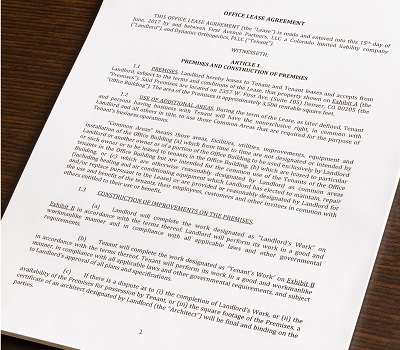What Does ‘NNN Lease / Triple Net Lease’ Mean?
There are many forms of commercial real estate leases, due to the fact that there is not a universal lease template or standard form at a state or national level. Unless you are dealing with the same landlord on the same property, the odds of seeing a lease agreement that is even relatively similar to a prior lease agreement is very rare. Even the length of a lease varies widely; and shorter is not always better. All this makes understanding the terms and conditions of a lease agreement even more vital.

One of the most common lease structures you will see is called a triple net lease (or NNN). Whether it’s a triple net lease, a double net lease, a single net lease, full-service lease or even a gross or modified-gross lease; they are all indicators of who pays for things like taxes, insurance and common area maintenance. As you can probably imagine, this has a substantial effect on the overall cost of leasing the property. In this blog, we will explain exactly what these terms mean, how they affect both the tenant and the landlord, and how a triple net lease can give you more bargaining power in lease negotiations.
Understanding Commercial Real Estate Leases and Clauses
Even though there is no standard contract or universal form for leases, it’s important to realize that nearly every lease agreement will be drafted heavily in favor of the landlord. Since evaluating leases can be daunting even for seasoned professionals, the best thing you can do to prepare yourself is to understand the different types of lease structures along with the benefits and obligations that accompany them. It’s not just important to find the right property, it’s important to achieve the right lease terms to ensure your practice can maintain proper cash flow and account for all ongoing expenses.
First and foremost, you should always hire a qualified real estate attorney to represent you in reviewing any lease or purchase contract. If you are signing a legally binding document that is drafted by an opposing party, it needs to be properly reviewed and explained to you. Finding an experienced tenant/buyer representative who understands the ins and outs of each type of net lease will provide you, not only peace of mind, but typically tens of thousands of dollars or more in savings from lower rent costs and higher concessions over the lifetime of your lease.
Prior to agreeing on terms for a property and moving forward to a draft lease, it’s important to understand the different types of lease structures and clauses. Those clauses affect how much you are going to pay for base rent and what other obligations or expenses get charged to you in the future, such as property taxes, insurance, and common area maintenance costs. Understanding this will help you properly evaluate all your options so you can confidently move forward with a particular property.
WHAT IS A NNN LEASE / TRIPLE NET LEASE?

A Triple Net Lease or NNN Lease is one of the most common lease structures in commercial real estate. In addition to the tenant’s base rent, a Triple Net Lease contains a provision that says the tenant is responsible for certain costs associated with operating the property. Those costs are outlined in three “Nets”.
Each “N” or “Net” stands for;
Net = Property Taxes
Net = Insurance
Net = Operating Expenses
Operating Expenses are often also referred to as CAM – Common Area Maintenance and are the expenses it takes to run the property. Those expenses include repairs and maintenance costs, trash removal, snow removal, landscaping, parking lot maintenance, security and fire safety, elevator maintenance, property management, exterior lighting and more.
Depending on the property, utilities and janitorial may also be included in the Operating Expenses or CAM. With a Triple Net Lease, you typically pay the landlord one check per month, but that check is broken down into two main categories:
- The Base Rent Amount
- The Triple Net Amount (or NNN)
Both your base rental costs and your triple net lease expenses are calculated on the square footage of the property that you occupy and lease. For example, if you leased a 2,000 SF space with a $24 per SF Base Rent (or lease rate) and $8 per SF Triple Net, the breakdown of payments would be:
- Base Rent: 2,000 SF x $24 per SF = $48,000 per year or $4,000 per month
- Triple Net: 2,000 SF x $8 per SF = $16,000 per year or $1,333 per month
Total rent would be $5,333 per month; with the Triple Net being $1,333 per month.
* Some states such as California break down their lease rates by price per SF per month.
Why Triple Net Leases Are Popular

Triple Net leases are the most common type of lease you will find in retail properties, newer medical office buildings, hospital campuses, and the majority of traditional office buildings. The next most common lease is a Full-Service Lease, followed by Gross Leases and Modified Gross Leases.
Triple Net Leases are popular for a number of reasons. They’re easier for tenants to secure, because they take some of the burden of property oversight and investment off of the landlord, such as building insurance and maintenance expenses. Since the tenant absorbs at least part of these expenses, they are able to secure a lower monthly rent for the base lease rate.
Triple Net Lease: Risks and Benefits
Like most things in life, Triple Net leases have both benefits and additional obligations. Let’s dive into each, so you can make a more informed decision regarding whether this option might make sense for you and your practice.
Benefits of Triple Net Leases
In most states, the rent is calculated on a per square foot per year cost. However, states like California charge rent on a per square foot per month cost. So, $24 per SF per year in Florida is the equivalent of $2 per SF per month in California.
This straightforward pricing is a major benefit of Triple Net leases, on top of that fact that — as mentioned above — they are often easier to secure for the tenant. Thanks to this structure, Triple Net leases can be a great setup for you as the tenant, especially if your location is fairly new and well-maintained. As, an added bonus, you can use this structure in your favor when participating in lease negotiations, particularly if you have high credit, strong financials, and a solid payment history.
Obligations of Triple Net Leases
There are also additional obligations s to Triple Net leases you need to be aware of. In exchange for receiving a lower price per square foot on your monthly base rent, the tradeoff is that you must be willing to take on the risk of the unknown. There could be a natural disaster that causes significant damage to the property — for which you are now responsible. Or there could be a system or machine failure, such as the HVAC goes down (heating, ventilation and air conditioning) that requires you to invest a large amount of money into repair costs or increased rent and utilities.
It’s important to assess all of these obligations and potential risks along with their likelihood ahead of signing a Triple Net lease, although it shouldn’t deter you if you feel the gross lease savings are worth the risk of taking on the responsibility for taxes, insurance, and operating expenses.
Confidential Conversations
Our CARR team is happy to have confidential conversations with you regarding all these considerations and how they apply to your actual practice. We pride ourselves in advocating on your behalf to help you make decisions that are in your best interest and set you up for the highest level of success for years to come.

Partnership
No matter what stage of your practice you’re in, professional tenant representation is a necessity. We’re here to keep your healthcare practice safe from financial liability and extra expenses to ensure you’re set up for the most successful future.
The Benefits of a Key Advisor
The commercial real estate industry is nuanced and complex, and we want you to delegate navigating this space to us! This allows you more time to focus on the complexities of the other aspects of your practice, while leaving the negotiation, site selection, due diligence process of commercial real estate to us. It’s what we’ve done for decades and you can be confident that we are advocating exclusively on your behalf in all areas.
Marketability
Your location says a lot about your practice, and effects every area of your business, such as staffing, patient retention, referrals, and much more. It’s incredibly important that you locate and market your practice appropriately. Our experts are here to help you dig into the marketability of each location, property and space you are considering in order to leverage your commercial property for the maximum benefit of your practice.
Managing the Process
Throughout this process, our experts are committed to walking alongside you every step of the way. We’ll help you see through the process from start to finish, including vetting properties during site selection and due diligence, to negotiating leases and purchase contracts with the most favorable terms possible, to assembling the most qualified and experienced team or partners in the industry. It’s our goal to act as your trusted advisor and advocate in order to help you achieve the results you deserve.
Negotiating
With a Triple Net lease, you as the tenant have an immense amount of negotiating power. Because the tenant pays more of the property’s expenses and takes on more risk, you can negotiate a lower monthly base rent, especially if you have a strong track record of high credit, and other signs of credibility. We can help you understand the best ways to leverage these attributes as you negotiate your lease.
In part 2 of this series, we will cover Full-Service Leases. Beyond that, there are additional types of leases such as Gross Leases and Modified Gross Leases, as well as dozens of additional lease terms. Each of these lease options comes with their own breakdown of what the tenant is responsible for and what the landlord takes on, resulting in huge differences in price per square foot and ongoing expenses. This terminology is important to understand as you evaluate real estate opportunities for your practice. Understanding each term will further equip you to make the most informed decision benefiting your practice.
To review additional commercial real estate terminology, click here.
For answers to frequently asked questions about commercial real estate, click here.